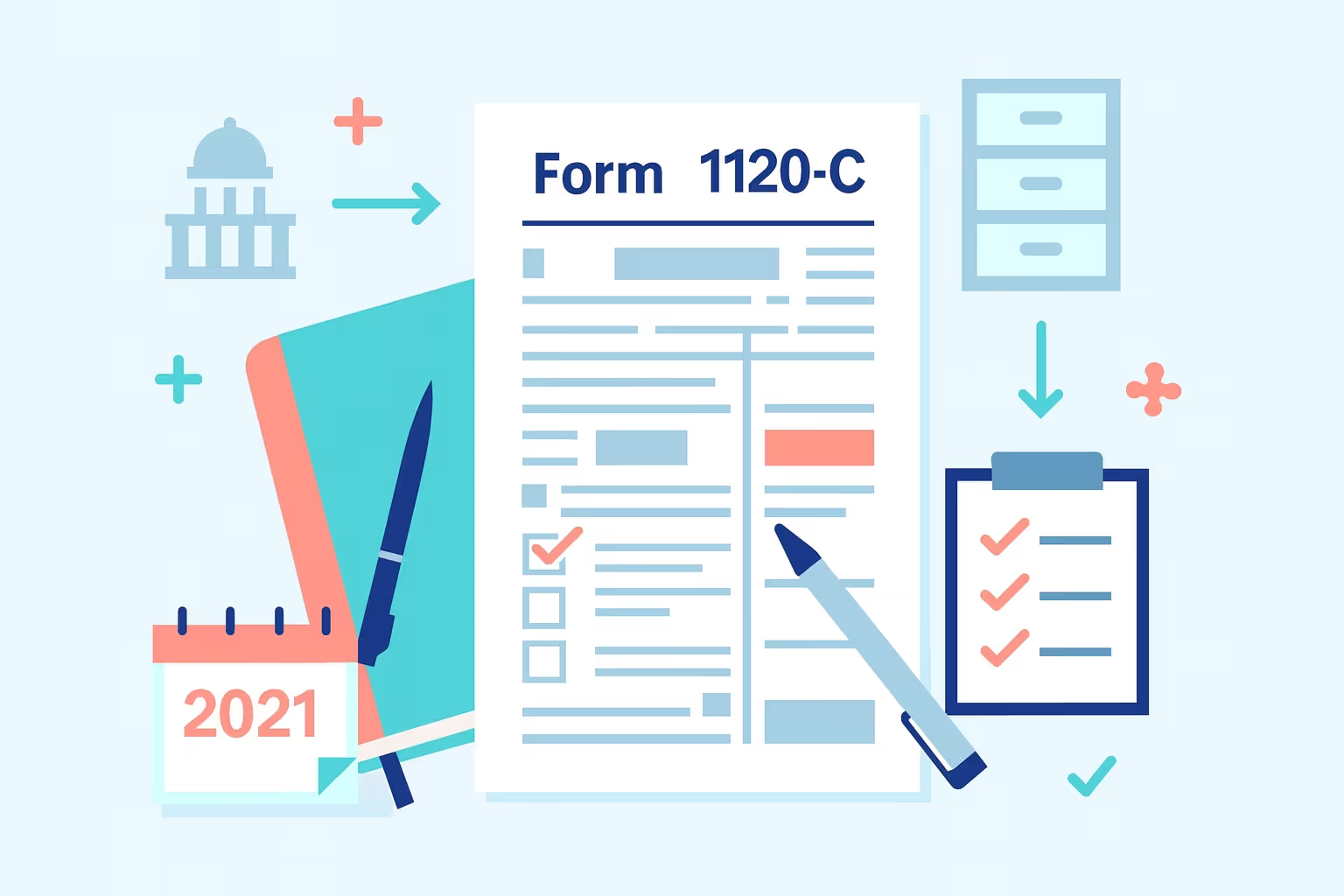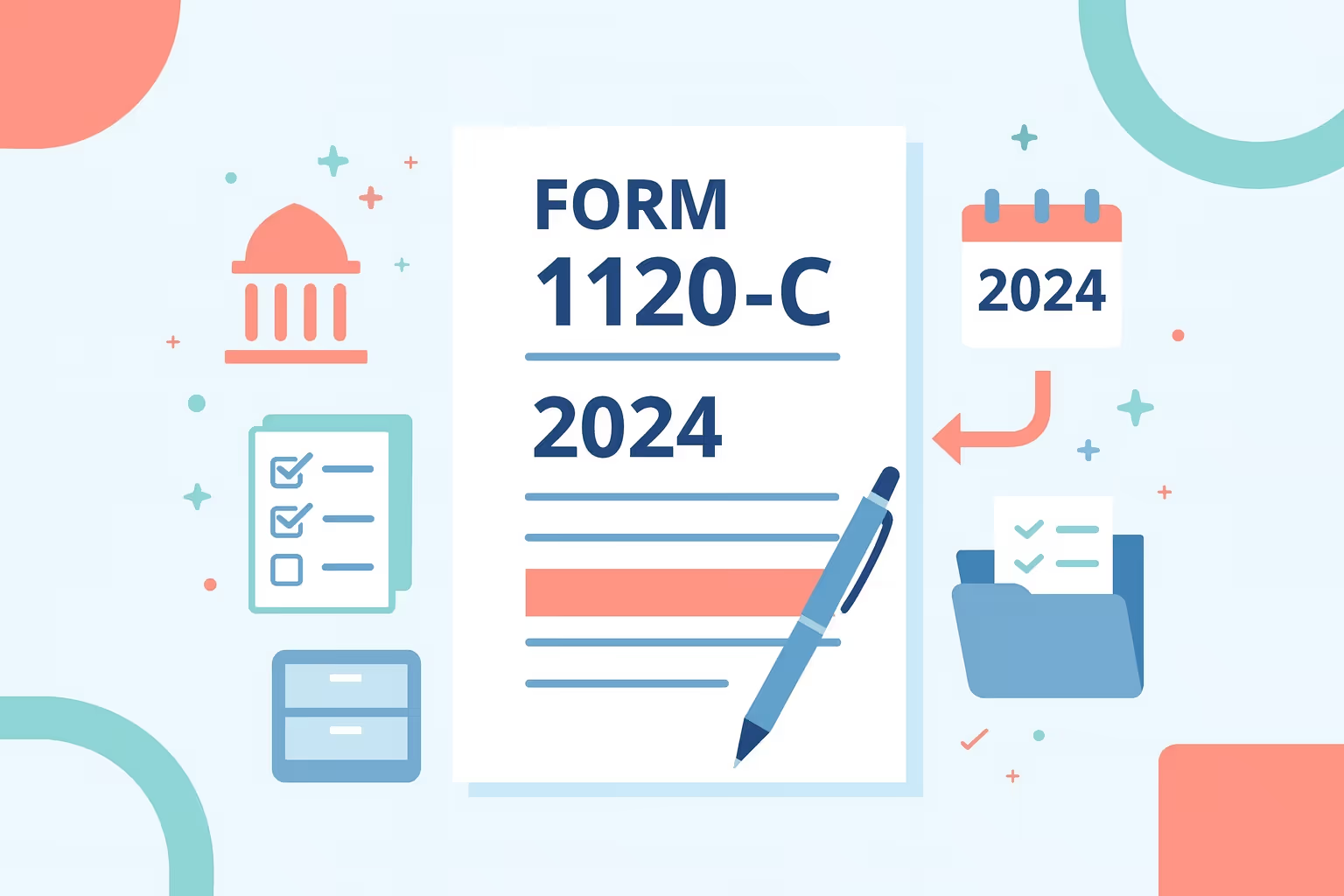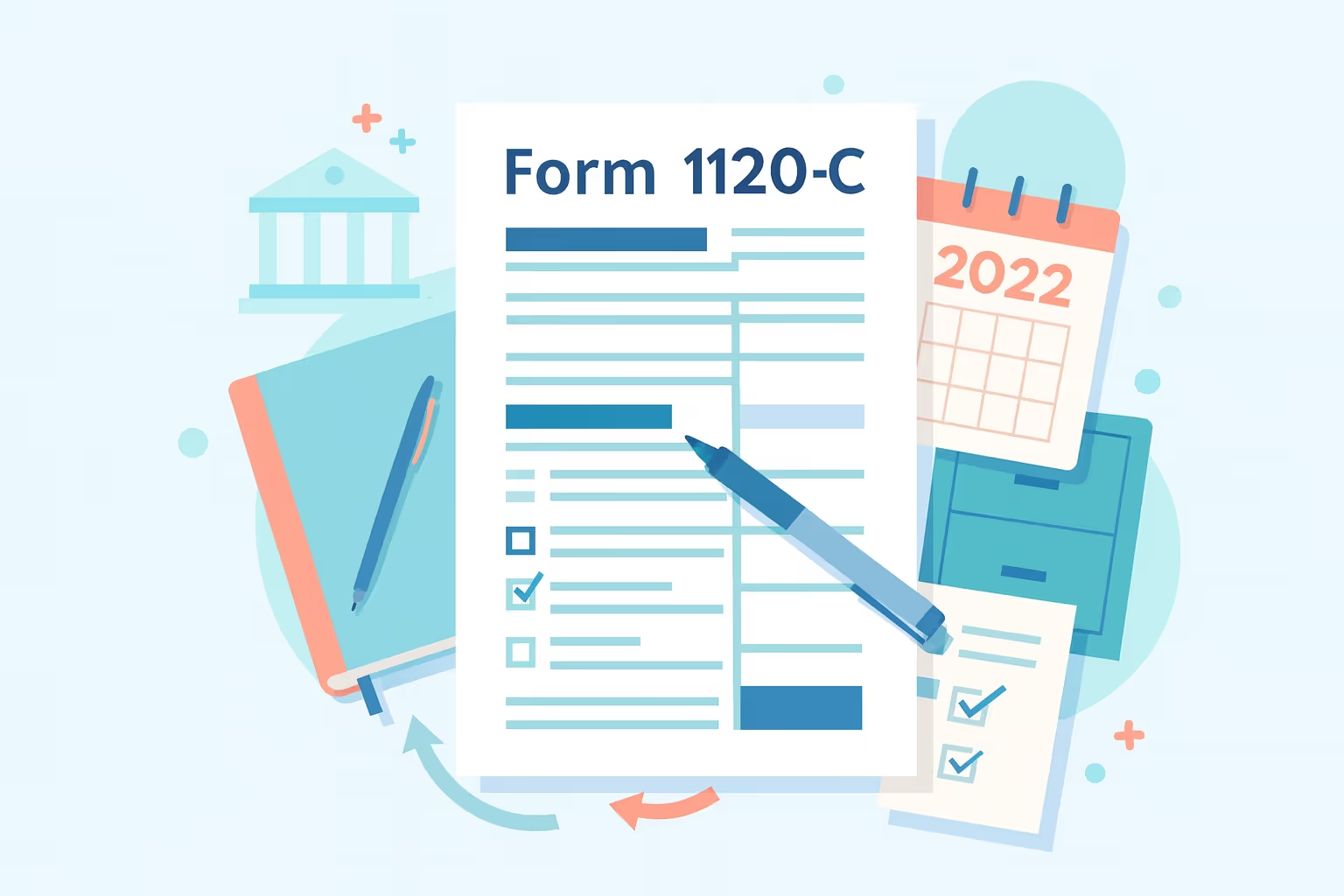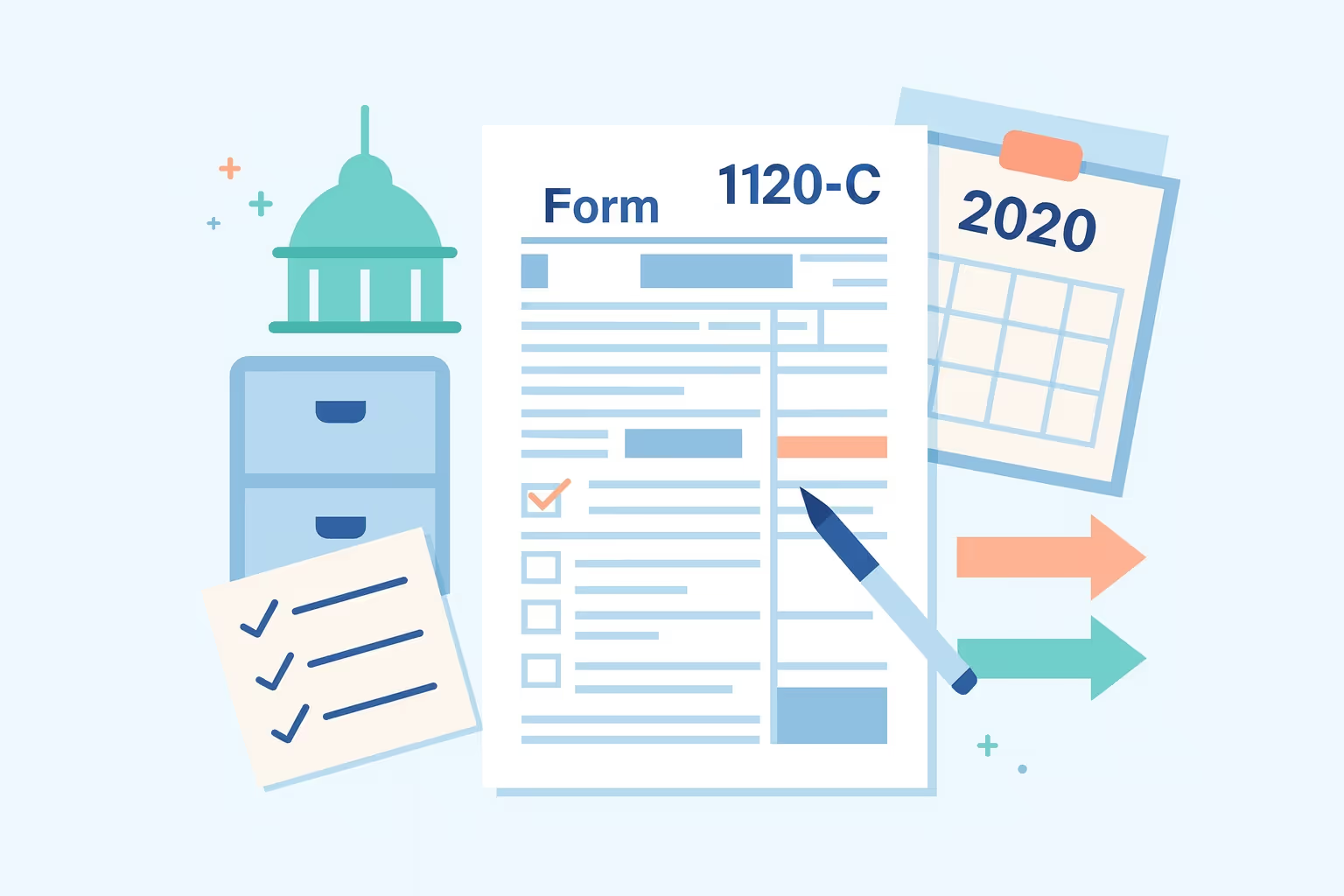
El Servicio de Impuestos Internos procesó millones de declaraciones de impuestos corporativos en 2021, pero muchas asociaciones cooperativas se enfrentaron a costosas sanciones y largas demoras en los reembolsos debido a simples errores de presentación. No cumplir con la fecha límite de presentación o declarar erróneamente los ingresos imponibles puede provocar rápidamente reveses financieros. El formulario federal 1120-C para el año tributario 2021 no es solo otro documento: es la declaración oficial de impuestos sobre la renta de las asociaciones cooperativas, y la presentación de informes precisos es esencial para el cumplimiento y la estabilidad financiera.
Para las cooperativas que operan bajo la sección 1381 del Código de Impuestos Internos, las obligaciones de presentación de impuestos se mantienen incluso en años con pocos o ningún ingreso. No presentar la declaración puede resultar en multas mensuales, pérdida de la reputación y un escrutinio innecesario por parte del Servicio de Impuestos Internos. Muchas organizaciones subestiman la importancia de una documentación precisa, especialmente cuando distinguen entre ingresos por mecenazgo y no mecenazgo. Estos errores a menudo retrasan los reembolsos y provocan auditorías, lo que aumenta el estrés de los miembros y los funcionarios.
Esta guía proporciona un enfoque paso a paso para presentar el formulario federal 1120-C para el año tributario 2021. Abarca la elegibilidad, los informes de ingresos y deducciones, los pagos de impuestos estimados, los cronogramas justificativos y los plazos de presentación. Ya sea que su cooperativa esté bien establecida o presente la solicitud por primera vez, comprender las reglas lo ayudará a evitar multas, proteger su estado de exención y garantizar que los informes sean precisos. La presentación anticipada, la presentación electrónica y la solicitud de todas las deducciones permitidas pueden ahorrar tiempo y dinero y, al mismo tiempo, brindar tranquilidad.
Comprensión del formulario federal 1120-C
Formulario federal 1120-C para el año tributario 2021 es la declaración oficial de impuestos sobre la renta requerida para las asociaciones cooperativas en los Estados Unidos. Se utiliza para declarar los ingresos, las deducciones, los créditos y para calcular la obligación tributaria. A diferencia de una declaración de impuestos sobre la renta individual, esta declaración de impuestos sobre la renta de las sociedades está diseñada específicamente para entidades comerciales que operan de manera cooperativa. El formulario garantiza el cumplimiento de los propósitos tributarios federales y, al mismo tiempo, protege el estatus legal de la cooperativa.
La presentación de este formulario no es opcional. Incluso en años sin ingresos sujetos a impuestos, el Servicio de Impuestos Internos exige que las cooperativas elegibles completen y presenten la declaración. La presentación demuestra que la presentación de informes es precisa, lo cual es fundamental para evitar sanciones y mantener los derechos de exención en virtud de la sección 521, si corresponde.
Quién debe presentar el formulario 1120-C
El IRS exige que las corporaciones que operan en forma cooperativa en virtud de la sección 1381 presenten el formulario 1120-C. Esto incluye:
- Cooperativas de agricultores en virtud del artículo 521: Estas organizaciones deben presentar la declaración incluso si no existen ingresos imponibles. La presentación mantiene su reconocimiento y garantiza que las deducciones se gestionen correctamente.
- Cooperativas no exentas incluyen las cooperativas de comercialización, suministro y servicios que asignan dividendos de patrocinio a los miembros. Están sujetas a las normas tributarias estándar y deben declarar los ingresos brutos, los ingresos netos y las deducciones.
- Otras asociaciones cooperativas: Cualquier corporación que opere en colaboración, incluso con una actividad mínima, cumple con los requisitos de presentación de esta declaración federal.
Quién no presenta el formulario 1120-C
No todas las organizaciones están obligadas a presentar este formulario. Las siguientes entidades no cumplen con los requisitos de presentación del 1120-C:
- Organizaciones exentas en virtud del Capítulo 1: Si bien la mayoría de las cooperativas deben presentar una declaración, organizaciones específicas permanecen exentas en virtud de diferentes secciones de la ley tributaria federal.
- Entidades financieras y de inversión: Las cooperativas de ahorro y crédito, las asociaciones de propietarios de viviendas, las compañías de inversión reguladas y los fideicomisos de inversión inmobiliaria se presentan en categorías separadas de declaraciones de impuestos sobre la renta de sociedades.
- Otras sociedades especializadas: Este requisito de presentación no se aplica a ciertas corporaciones extranjeras, corporaciones S y corporaciones C que no están organizadas como cooperativas.
Comparación: organizaciones que presentan solicitudes frente a organizaciones que no declaran
Entidades que Debe presentar el formulario 1120-C
- Cooperativas de agricultores en virtud del artículo 521
- Cooperativas no exentas (comercialización, suministro, servicio)
- Cooperativas que distribuyen dividendos de mecenazgo
- Cualquier corporación que opere bajo la sección 1381
Entidades que No presente el formulario 1120-C
- Organizaciones exentas en virtud del Capítulo 1
- Cooperativas de crédito
- Asociaciones de propietarios
- Sociedades de inversión reguladas
- Fideicomisos de inversión inmobiliaria (REIT)
- Ciertas sociedades extranjeras y otras sociedades no cubiertas por la sección 1381
Cambios clave para el año tributario 2021
Antes de continuar con el proceso de presentación paso a paso, es esencial revisar los cambios que se aplicaron a las asociaciones cooperativas en 2021. Los propósitos de los impuestos federales cambiaron ligeramente debido a las disposiciones de alivio de la COVID-19 y a la actualización de las deducciones. Estos cambios afectaron a la forma en que se calculaba la obligación tributaria y a la forma en que las cooperativas declaraban los ingresos imponibles. Comprender estas actualizaciones es crucial para informar con precisión y evitar errores en la declaración de impuestos sobre la renta de su corporación.
Créditos relacionados con la COVID-19
La Ley del Plan de Rescate Estadounidense y las disposiciones anteriores de la Ley CARES preveían medidas de alivio que afectaban directamente a las cooperativas que presentaban el formulario 1120-C para el año tributario 2021.
- Créditos salariales calificados por licencia familiar y por enfermedad: Las cooperativas que pagaban a los empleados por ausencias relacionadas con la COVID podían solicitar estos créditos. Esto redujo la obligación tributaria total y ayudó a cubrir los costos de nómina inesperados.
- Crédito de retención de empleados: Para la mayoría de las cooperativas, este crédito se aplicó solo a los salarios calificados pagados antes del 1 de octubre de 2021. Las empresas emergentes en recuperación podrían solicitarlo hasta el 1 de enero de 2022. La presentación de la solicitud sin considerar adecuadamente este crédito podría resultar en una subnotificación o en un pago excesivo.
Deducción de la Sección 199A (g)
La deducción de la Sección 199A (g) reemplazó la deducción por actividades de producción nacionales. Era esencial para determinar los ingresos imponibles de las cooperativas que realizaban actividades de producción calificadas.
- Elegibilidad y alcance: La deducción se aplica a los ingresos de actividades de producción calificadas, y las cooperativas podrían optar por asignar los beneficios de ingresos directamente a los mecenas.
- Interacción con la Sección 1382: Cuando se transfirió a los clientes, la cooperativa estaba obligada a reducir su deducción de la Sección 1382. Esta regla a menudo confunde a quienes declaran impuestos por primera vez y no están familiarizados con los ajustes de dividendos por patrocinio.
Actualizaciones del formulario 1120-C
El Servicio de Impuestos Internos emitió varias aclaraciones y actualizaciones de formularios para 2021.
- Programa H: Los ajustes a las deducciones de la Sección 1382 requirieron una revisión cuidadosa, particularmente para las cooperativas que asignan dividendos de patrocinio.
- Programa K: Se agregaron nuevas divulgaciones de información para mejorar el cumplimiento. Estos incluían detalles sobre los métodos de contabilidad y la información sobre la propiedad.
- Cambios en las instrucciones: El IRS aclaró cómo las cooperativas deben informar sobre las asignaciones específicas de dividendos de mecenazgo. La falta de estas actualizaciones podría provocar el rechazo de las declaraciones de impuestos o un retraso en el procesamiento.
Proceso de presentación paso a paso
El proceso de presentación del formulario federal 1120-C para el año tributario 2021 puede resultar abrumador, pero dividirlo en pasos manejables lo hace mucho más fácil. Cada etapa tiene requisitos de presentación de informes específicos, y los errores pueden provocar retrasos en los reembolsos, multas o auditorías. A continuación se muestra un proceso gradual que las asociaciones cooperativas deben seguir para garantizar la precisión de los informes y el cumplimiento de las normas del Servicio de Impuestos Internos.
Paso 1: Reunir la información requerida
Las cooperativas deben recopilar toda la documentación esencial antes de completar el formulario 1120-C. La falta de información en esta etapa es uno de los errores de presentación más comunes.
- Necesitará su número de identificación patronal (EIN), los estados financieros completos y la declaración de impuestos sobre la renta corporativa del año anterior. Esta información garantiza la continuidad y la precisión de los informes.
- Mantenga un registro de los ingresos brutos, los ingresos de mecenazgo y no mecenazgo, los pagos de impuestos estimados y cualquier ajuste que afecte el ingreso total. Estos documentos respaldan su declaración de impuestos para las asociaciones cooperativas y deben conservarse durante al menos tres años.
Paso 2: Complete el encabezado del formulario
La sección de encabezado del formulario 1120-C proporciona al IRS información básica sobre la cooperativa. Aunque parezca simple, los errores aquí a menudo provocan demoras.
- Introduzca el año tributario correcto, que puede ser un año natural o un año fiscal aprobado. El uso de fechas incorrectas puede hacer que el IRS rechace la presentación.
- Identifique su tipo de cooperativa: cooperativa de agricultores o cooperativa no exenta de la Sección 521. Esta selección determina qué deducciones y reglas de presentación de informes se aplican.
Paso 3: Reportar los ingresos
La declaración de ingresos es una de las partes más críticas de la declaración de impuestos sobre la renta de la corporación. Todos los ingresos deben clasificarse correctamente para evitar multas.
- Informe los ingresos brutos de las operaciones comerciales, incluidos los ingresos brutos. Reste las devoluciones y las deducciones para llegar a las cifras netas.
- Incluya ingresos adicionales, como ganancias de capital, ganancias netas, alquileres, regalías y otras fuentes de ingresos imponibles. Los ingresos no relacionados con el patrocinio deben estar claramente separados para cumplir con las reglas de las cooperativas.
Paso 4: Reclame deducciones y artículos especiales
Las deducciones reducen directamente los ingresos imponibles, por lo que es esencial reclamar todos los artículos elegibles. Las cooperativas deben distinguir cuidadosamente entre las deducciones regulares y las deducciones especiales.
- Las deducciones ordinarias incluyen los sueldos y salarios, los intereses, las contribuciones caritativas y los costos de los bienes vendidos. Si los montos son significativos, cada uno de ellos requiere cronogramas de respaldo.
- Las deducciones especiales incluyen las deudas incobrables, la deducción de la Sección 199A (g) y los ajustes en virtud del Ley de recortes de impuestos y empleos. Las cooperativas no exentas pueden solicitar deducciones diferentes en comparación con las cooperativas de la Sección 521.
Paso 5: Calcular la renta imponible y la obligación tributaria
Una vez que se ingresan los ingresos y las deducciones, la cooperativa calcula los ingresos imponibles. Esto determina la obligación tributaria sobre la renta adeudada al gobierno federal.
- Los ingresos totales menos las deducciones permitidas dan como resultado ingresos imponibles. Esta cifra debe declararse con precisión para evitar multas.
- Calcule el impuesto total de la cooperativa aplicando las tasas impositivas correctas a los ingresos imponibles. Los ajustes, como la transferencia de pérdidas operativas netas, pueden reducir la responsabilidad, pero requieren una documentación precisa.
Paso 6: Revise los cronogramas de soporte
Los cronogramas de respaldo proporcionan al IRS un desglose detallado de los montos declarados. Los cronogramas faltantes o incompletos son una de las principales razones por las que el IRS los rechaza.
- El Anexo C se usa para dividendos y deducciones especiales. El Anexo G asigna los ingresos entre las actividades de mecenazgo y las no relacionadas con el mecenazgo. El Anexo H calcula las deducciones de la Sección 1382.
- Según el tamaño de su cooperativa, es posible que también deba presentar el Anexo D para las ganancias de capital, el Anexo R para las asignaciones específicas o los Anexos L y M-1/M-3 para la conciliación del balance. Estos cronogramas son cruciales para informar con precisión el total de los activos, los ingresos totales y los ingresos netos.
Paso 7: Firmar, archivar y pagar
El último paso es enviar el formulario y realizar los pagos requeridos; si lo presenta sin pago ni firma, se rechaza automáticamente.
- La fecha límite de presentación es el día 15 del noveno mes después del cierre del año fiscal de la cooperativa. Para los contribuyentes del año calendario, esto significa el 15 de septiembre de 2022. Compruebe siempre la fecha límite original para evitar multas por retraso.
- El pago debe hacerse electrónicamente mediante el Sistema electrónico de pago de impuestos federales (PASOS). Si las cooperativas esperan adeudar al menos 500 dólares, también deben hacer pagos trimestrales de impuestos estimados.
Puede elegir entre la presentación en papel y la presentación electrónica (e-file). Si bien se aceptan ambas, la presentación electrónica reduce los errores y confirma ante el IRS, lo que la convierte en la opción más inteligente para la mayoría de las cooperativas.
Opciones y plazos de presentación
Una vez que el formulario 1120-C esté completo, la cooperativa debe elegir cómo presentarlo. Tanto la presentación en papel como la electrónica están disponibles, pero cada una tiene sus ventajas y desventajas. La presentación correcta garantiza que el Servicio de Impuestos Internos procese la declaración sin demoras y que los reembolsos se reciban a tiempo.
- Las declaraciones en papel se envían por correo al centro de procesamiento del IRS en Ogden, Utah. Supongamos que la cooperativa tiene su sede fuera de los Estados Unidos. En ese caso, el IRS exige que se envíe el correo a un apartado postal diferente. El uso de una dirección incorrecta es una razón común por la que se rechazan las declaraciones de impuestos sobre la renta de las sociedades.
- La presentación electrónica (e-file) es más rápida y proporciona una confirmación inmediata del IRS. Los reembolsos de las declaraciones presentadas electrónicamente suelen llegar en un plazo de 30 días, mientras que las declaraciones en papel pueden tardar ocho semanas o más. En el caso de las cooperativas con horarios complejos o ingresos totales elevados, la presentación electrónica también reduce la posibilidad de errores de transcripción.
Plazos de presentación
La fecha límite para presentar el formulario federal 1120-C para el año tributario 2021 depende de si la cooperativa usa un año calendario o fiscal. El incumplimiento de estos plazos expone a la cooperativa a multas e intereses severos.
- La fecha límite de presentación para las cooperativas que utilizan un año calendario fue el 15 de septiembre de 2022. Para los contribuyentes del año fiscal, la fecha límite es el día 15 del noveno mes después del final del año tributario.
- Se aplican multas por la presentación tardía o incorrecta. La multa por no presentar la declaración es del 5 por ciento del impuesto pendiente de pago por cada mes o parte del mes en que la declaración se retrase, hasta un 25 por ciento. La multa por falta de pago es del 0.5 por ciento mensual. Ambas multas continúan hasta que el saldo se pague en su totalidad.
Presentación en papel frente a presentación electrónica
Archivado en papel
- Tiempo de procesamiento: Al menos de 6 a 8 semanas
- Plazo de reembolso: Por lo general, más de 8 semanas
- Problemas comunes: Dirección incorrecta, firmas faltantes y demoras en el procesamiento manual
Presentación electrónica (e-file)
- Tiempo de procesamiento: La confirmación del IRS suele tardar 24 horas
- Plazo de reembolso: Unos 30 días
- Problemas comunes: Problemas de compatibilidad de software e interrupciones ocasionales del sistema de archivos electrónicos
Errores comunes de presentación que se deben evitar
Incluso cuando las cooperativas entienden sus requisitos de presentación, son comunes los errores en el formulario federal 1120-C para el año tributario 2021. Estos errores retrasan los reembolsos y aumentan el riesgo de auditorías y sanciones. Conocer las dificultades de antemano ayuda a las asociaciones cooperativas a presentar sus solicitudes con más confianza y a evitar costos innecesarios.
Clasificación errónea de los ingresos por mecenazgo frente a los ingresos no relacionados con el mecenazgo
Uno de los errores más frecuentes consiste en declarar erróneamente los ingresos de mecenazgo y no mecenazgo.
- Los ingresos por mecenazgo provienen de actividades directamente relacionadas con los negocios de la cooperativa con sus mecenas. Los ingresos no relacionados con el mecenazgo, como los intereses devengados por los depósitos bancarios, son incidentales. Tratar uno como el otro puede distorsionar los ingresos imponibles y establecer erróneamente las deducciones.
- El Servicio de Impuestos Internos revisa de cerca estas asignaciones. La presentación de informes erróneos puede resultar en una obligación tributaria ajustada y en posibles multas. Las cooperativas deben garantizar una documentación precisa que respalde sus asignaciones.
EIN y dirección de presentación incompletos o incorrectos
Otro error que se puede evitar es proporcionar un número de identificación incorrecto o enviar el formulario a la ubicación equivocada.
- El uso del número de seguro social de una persona en lugar del número de identificación del empleador de la cooperativa provoca el rechazo de las declaraciones de impuestos y demoras en el procesamiento. Verifique siempre el EIN antes de presentar la solicitud.
- El envío por correo a una oficina local del IRS o el uso de la dirección de un agente registrado en lugar de la dirección comercial principal de la cooperativa provoca demoras. La presentación de informes precisos comienza con la comprensión correcta de estos conceptos básicos.
Pagos de impuestos estimados atrasados
Muchas cooperativas subestiman la importancia de los pagos de impuestos estimados trimestrales.
- Los pagos estimados son obligatorios si la cooperativa espera adeudar al menos 500 dólares en impuestos totales para el año. El incumplimiento de los plazos se traduce en multas que se acumulan rápidamente.
- El formulario 1120-W se puede usar para calcular los pagos de impuestos estimados. Las cooperativas que no lo utilizan con frecuencia pagan menos y se enfrentan a cargos por intereses y multas.
Consideraciones especiales para quienes declaran sin actividad o por primera vez
No todas las cooperativas generan grandes cantidades de ingresos cada año. Es posible que algunas incluso no tengan ninguna actividad. Es posible que otros presenten el formulario federal 1120-C por primera vez. Ambas situaciones conllevan requisitos únicos que las asociaciones cooperativas deben comprender para cumplir con las normas del Servicio de Impuestos Internos.
Requisitos de presentación de cero actividad
Incluso si una cooperativa no tiene ingresos brutos, ingresos imponibles o dividendos de patrocinio que declarar, el IRS aún espera recibir una declaración oportuna.
- Se requiere una presentación si la cooperativa mantuvo su existencia legal durante el año fiscal. El número de identificación del empleador y el estado corporativo generan la obligación de presentar la declaración independientemente de la actividad financiera.
- Una cooperativa inactiva debe completar el formulario con ceros en las secciones de ingresos y deducciones. Si bien puede parecer innecesario, la presentación de la solicitud protege la posición de la cooperativa a los efectos de los impuestos federales y evita multas o la pérdida del reconocimiento de la Sección 521.
Las cooperativas pequeñas con menos de 250 000$ en ingresos y activos totales pueden reunir los requisitos para una presentación simplificada. En este caso, no es necesario que completen los anexos G, L o M-1. En su lugar, proporcionan información resumida sobre el Anexo K.
Guía para quienes declaran por primera vez
Las cooperativas recién establecidas se enfrentan por primera vez al desafío de entender las leyes tributarias y los requisitos de presentación de informes del IRS. Una preparación cuidadosa evita errores costosos.
- El primer paso es obtener un EIN. Este número debe incluirse en la declaración de impuestos sobre la renta y el archivo corporativo de cada corporación. Sin él, el IRS no procesará la declaración.
- El mantenimiento de registros debe comenzar de inmediato. Las actas de constitución, los estatutos, los acuerdos de los miembros y las actas de las reuniones de la junta directiva son documentos cruciales. Demuestran la base cooperativa para las operaciones y respaldan las deducciones y las asignaciones de mecenazgo.
- Las personas que presentan su declaración por primera vez también deben establecer una cuenta EFTPS para el pago de impuestos. Esto garantiza que los impuestos estimados y los pagos finales se realicen de forma electrónica y puntual. Consultar a un profesional de impuestos calificado puede ayudar a evitar confusiones en torno a las pérdidas operativas netas, la retención de asignaciones por unidad y otros problemas técnicos.
Preguntas frecuentes (FAQ)
¿Cuál es la fecha límite para presentar el formulario federal 1120-C?
La fecha límite de presentación depende de si su cooperativa utiliza un calendario o un año fiscal. Para las cooperativas de un año calendario, la fecha límite para el año tributario de 2021 fue el 15 de septiembre de 2022. Los declarantes del año fiscal deben presentar la declaración del impuesto sobre la renta de sociedades antes del día 15 del noveno mes después de que finalice el año. No cumplir con la fecha de vencimiento puede generar multas y cargos por intereses, por lo que es esencial presentar informes precisos y presentarlos a tiempo.
¿Las cooperativas deben presentar una declaración si no hay ingresos imponibles?
Incluso sin ingresos tributables o ingresos brutos, una cooperativa que opere bajo la sección 1381 aún debe presentar el formulario 1120-C. El Servicio de Impuestos Internos exige presentar la declaración de impuestos federales siempre y cuando la cooperativa no se haya disuelto y mantenga un número de identificación del empleador. La presentación evita problemas de cumplimiento y preserva la elegibilidad para recibir deducciones especiales. Omitir la presentación podría resultar en sanciones y en la pérdida de legitimación en virtud de las leyes tributarias cooperativas.
¿Pueden los dividendos del mecenazgo compensar los ingresos no relacionados con el mecenazgo?
No, los dividendos de mecenazgo no se pueden usar para compensar los ingresos no relacionados con el mecenazgo. El IRS exige que los ingresos se asignen adecuadamente en el Anexo G para garantizar la precisión. Los ingresos por mecenazgo provienen de negocios realizados con o para clientes, mientras que los ingresos no relacionados con el mecenazgo, como los intereses o las ganancias por inversiones, son incidentales. La combinación de estas categorías conduce a cálculos incorrectos de las obligaciones tributarias y puede provocar retrasos o rechazos. Las asociaciones cooperativas deben documentar y distribuir cuidadosamente los ingresos entre ambas fuentes.
¿Qué sanciones se aplican por la presentación tardía o incorrecta?
El Servicio de Impuestos Internos aplica sanciones estrictas a las declaraciones de impuestos sobre la renta corporativas tardías o incorrectas. La multa por no presentar la declaración es del 5 por ciento del impuesto mensual no pagado, hasta un 25 por ciento. La multa por falta de pago es del 0.5 por ciento mensual sobre los saldos pendientes de pago. Los intereses se acumulan tanto en los impuestos como en las multas hasta que se complete el pago. La presentación de impuestos con precisión, el pago puntual de los impuestos estimados y la revisión de los cronogramas justificativos ayudan a minimizar los riesgos de sanciones y medidas coercitivas.
¿Deberían las cooperativas utilizar siempre la presentación electrónica para su declaración federal?
Sí, se recomienda encarecidamente la presentación electrónica (e-file). La presentación electrónica confirma que el IRS ha recibido la declaración, reduce los errores de transcripción y acelera los plazos de reembolso. Los reembolsos de las presentaciones electrónicas pueden llegar en 30 días, en comparación con las ocho o más semanas de las presentaciones en papel. Para las asociaciones cooperativas que presentan cronogramas complejos, la presentación electrónica también simplifica los requisitos de presentación de informes. Un profesional de impuestos puede ayudar a garantizar que su cooperativa cumpla con los plazos y utilice la presentación electrónica para evitar errores costosos.
























